In this piece
Social media communities and reporting of the COVID-19 pandemic

Facebook CEO Mark Zuckerberg during his keynote at Facebook Inc's annual F8 developers conference in San Jose, California, U.S., April 30, 2019. REUTERS/Stephen Lam
In this piece
1. Introduction: A Brief History of Online Groups and Communities↑ | 2. Key Findings and recommendations↑ | 3. Methodology↑ | 4. Findings in more detail↑ | 5. Conclusion↑ | Select bibliography↑ | About the Author↑Mark Frankel explores how journalists can work with online communities for sources of content and testimony as the coronavirus pandemic unfolds.
DOI: 10.60625/risj-gbfx-w792
1. Introduction: A Brief History of Online Groups and Communities ↑
Whether it’s a Slack channel, WhatsApp or Facebook group, on Zoom, Microsoft Teams, or Houseparty, there are numerous opportunities to connect with groups of friends, colleagues, and other like-minded individuals online today.
Digital communities have been an integral part of the internet for decades. From email discussion lists to computer bulletin board systems (BBS) Usenet and Google groups, AOL chat rooms and early web-based social networks like SixDegrees.com, Friendster, and MySpace, the internet has provided us with several ways to forge and develop connections with one another.
All the social media applications and chat apps we turn to on our smartphones today are simply the latest iterations in online community interaction.
One such social media network, Reddit, founded by two college friends just months after Mark Zuckerberg created Facebook, is one of the most successful examples of an online chat forum to date. The platform, often referred to as ‘The Front Page of the Internet’, has rapidly grown to become one of the most influential networks for digital conversation. More than 130,000 active subreddit communities and 430 million monthly active Redditors create news for others by commenting, sharing, and voting on a huge array of topics every day.
If the idea had been to create a series of bookmarked links on interesting reads Reddit would have struggled to differentiate itself from early news aggregators like Delicious or Digg. Instead, its founders sought to develop a curated version of what people most want to read. To save you the trouble of finding what interests you in a specific publication, Redditors are served up a digest of everything they’d most like to see or find from numerous sources in one place. Reddit has become a fascinating experiment in news curation and online democracy and, as I point out in this report, despite some clear challenges around the hosting and dissemination of falsehoods and conspiracies, it still has a good deal to offer journalists.
With over 2.6 billion active monthly users and over 1.4 billion of them active in millions of ‘meaningful groups’ on a regular basis (according to its 2020 Q1 statement)1 Facebook is a much larger social network than Reddit. Facebook developed ‘groups’ a decade ago to help those looking to create or join a chat forum around common interests and hobbies. The product evolved over time, becoming a much bigger focus following the 2016 US presidential election as the social media giant dealt with allegations of Russian interference. As the platform itself has become noisier, more prone to abuse, and less intimate so a larger number of Facebook users have gravitated towards private (or invitation-only) Facebook groups.
It was perhaps unsurprising, therefore, that Facebook’s CEO Mark Zuckerberg would use his keynote address to delegates of his company’s annual F8 developer conference in San José, California, on 30 April 2019 to declare: ‘The future is private.’
Zuckerberg has always insisted his goal is to ‘help build community’. For many commentators it appeared that the social media network was simply intent on pivoting away from anti-trust investigations and the 2018 Cambridge Analytica scandal, where data from millions of Facebook users had been misappropriated via a third-party app used to target them with political advertising, than in locking down their products.

However, Zuckerberg’s decision had been long in the gestation. In a lengthy ‘manifesto’ (published in March 2019) he said:
the future of communication will increasingly shift to private, encrypted services where people can be confident what they say to each other stays secure and their messages won’t stick around forever.
This focus on privacy, encryption, and ephemeral messaging may seem like a blow to news media, brands, and other organisations seeking to benefit directly from placing their content in front of audiences in public news feeds. However, as the problems associated with some of the algorithms and advertising technologies social media companies rely on become more visible, and some reconsider their engagement with some of the more relatively open and public platforms, the pivot to invitation-only groups and communities on social media networks may be a genuine opportunity for enterprising journalists, news media, and others. Used responsibly, these online spaces are a rich new digital beat.
In the summer of 2018, I conducted a five-week study as a visiting Knight Nieman Harvard Fellow on how journalists could leverage semi-closed social media groups and communities to foster a new digital beat. The focus of my work was on under-reported stories and under-represented communities. I identified a number of ethical and practical considerations – particularly around transparency and newsroom diversity. I also discovered a large volume of first-hand stories and reflections that were clearly of interest and value to journalists but were either going unreported or under-reported.
With all of this in mind I decided to conduct a follow-up study in the first quarter of 2020. The aim of which was two-fold:
- To identify communities, perspectives, and contributions in invitation-only Facebook groups and subreddit communities that were largely under-represented across the news media over the course of several months.
- To outline some practical tips and guidance for news journalists seeking to source and leverage a broad range of verifiable and useful contributions from semi-closed and under-explored social media groups and communities.
Although my original intention was to focus on a mix of topical stories, the arrival and spread of the coronavirus pandemic dominated during the period of my work.
A subreddit community dedicated to tracking and mapping COVID-19 cases.

Throughout this study I discovered plenty of news-worthy accounts, pictures, and video in groups and communities. For the most part these were fairly straightforward to corroborate and, in some cases, being shared well ahead of mainstream broadcast and print media.
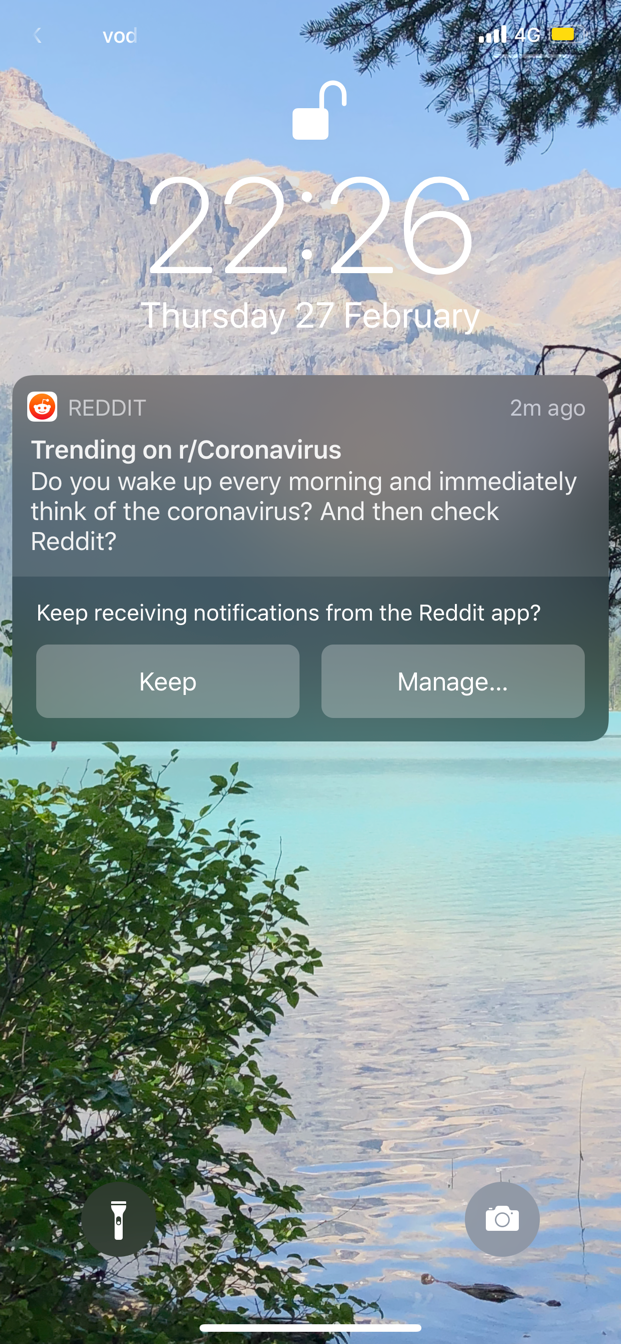
One example of this from the UK was a moving video uploaded by a critical care nurse, Dawn Bilbrough, on 19 March to her own Facebook profile. Dawn’s heart-felt account of her inability to find food in a local supermarket was widely disseminated across Facebook groups and other social media platforms before being picked up by BBC Yorkshire and other traditional media 24 hours later.
In this report I will draw on examples like this to describe the experience of using invitation-only Facebook groups and subreddit communities to look for stories, while outlining some tips for practising journalists.
2. Key Findings and recommendations ↑
After spending several months in Facebook groups and subreddit communities, I found that, from the point of view of journalists, there are at least three categories of ‘viable contribution’ – potentially newsworthy material – to be found in Facebook groups and subreddit communities:
- First-hand testimony in text, images, or video from people who had witnessed or had been passed something of interest and relevance. This proved to be the richest category in terms of overall contributions, particularly in the first six weeks of my work as the pandemic first emerged and spread. In both private Facebook groups and Reddit sub-communities I found that more eyewitness testimony was from people outside of these groups and communities and then shared within them.
- Research from those with defined expertise or access to experts (e.g. medical, scientific, technical). This ranged from live-streaming and recorded video contributions on Facebook to the sharing of field research and academic studies on Reddit.
- Peer-group discussion from those with issues of direct relevance (e.g. home schooling of children, food delivery, understanding of risk and of official guidance). This permeated all the communities I joined as people were keen to pick apart their experiences and attitudes with one another in an ongoing focus group.
Overall, I found it easy to discover communities to join and there was never an issue in gaining entry to a private Facebook group (or any need to disguise my identity or motives). Once in a group or community, however, it took a number of days to familiarise myself with the most active members, get the measure and tone of conversations and contributions, and to identify which of these communities was likely to be of greatest value for news journalists. Some group members were outwardly hostile towards journalists. Others were keener to share their experiences and views but conscious of the fact that they were doing so in a community of like-minded people.
Both Facebook and Reddit provided a roughly equal volume of first-hand testimony, research, and peer-group discussion. Although there was some overlap in discussion topics, there was far less duplication of eyewitness accounts and research across the two platforms.
There was a marked difference between the volume and variety of viable content I encountered during the first six weeks of my work and what I witnessed thereafter. It’s perhaps unsurprising that more potentially news-worthy material will surface through online communities in the initial days and weeks of a developing story than once the story has been picked over for several weeks and audiences are tiring of the daily coverage. This was particularly true of first-hand testimony.
A large number of potentially news-worthy eyewitness accounts, images, and videos that I discovered through my membership and participation in these social media groups were removed from the platforms days after they were first uploaded. Some may have been removed by the uploaders and content owners as more evidence came to light – or by the group moderators as the contributions were impossible to verify and/or potentially misleading. However, as the majority of these accounts were from individuals in China – or from friends of relatives of those in China – it’s also possible that some of these accounts were removed to protect the authorities from further investigation. Whatever the truth, a journalist intent on investigating a developing story through eyewitness testimony of this kind clearly needs to act fast to verify effectively, as well as to source what they encounter.
Finally, it’s important to emphasise that I encountered plenty of examples of potentially factually incorrect and deceptive content during my work. These included:
- Conspiracy theories about bioweapons, 5G masts, and the role the Chinese authorities may have played in the spread of the virus.
- Posts linking the supposed ‘patenting’ of the virus to the Gates Foundation.
- A number of ‘ads’ on personal protective equipment (PPE) and natural remedies for the virus.
- Bogus ‘fines’ issued via text message to people who had left their homes in contravention of lockdown orders.
- False presentation of ‘facts’ and linking to supposed ‘official’ sources. For example, an alleged leak of epidemiological data on Tencent proved a complete distraction.
- Dissemination of fake video, such as footage of British Muslims (in Wembley, London) allegedly breaking lockdown rules in March by choosing to pray on the streets. The video predated the lockdown. And graphic video (which I will not share) of a family that had supposedly succumbed to the virus but actually related to a widely reported carbon monoxide incident in 2018.
Recommendations for Journalists
These key findings led me to outline ten practical recommendations for those journalists intent on using social media groups and communities.
- First and foremost, it’s important to be selective and discerning. There’s NO point in joining every group and community you encounter on a given subject or theme. Some are far more interested in conspiracies than in facts. Look at how active they are, at the group description, and at administrator and moderator profiles. Public groups on Facebook tend to be larger, noisier, and more off-topic than private, invitation-only groups but it’s worth spending some time exploring the contributions and profiles of those most active in the groups to determine whether it’s worth remaining or moving on.
- Full transparency is essential. There may be an editorial case for going undercover. However, building trust is vital. Many of the questions that you will need to answer to gain entry to invite-only, private groups on Facebook, are straightforward to answer without the need to reveal or detail your inquiry. It’s unlikely for you to need expertise, a background, or special interest in the subject too. However, given the importance of being able to speak directly to contributors to verify and corroborate their stories, it’s not going to help you to pretend you’re not a journalist. Having said that, my advice is to spend several days ‘taking the temperature’ of the group and consider making your own contributions before reaching out to others.
- Set up some notifications for yourself and work out a regular check-in routine. Monitoring conversation threads in groups and communities 24/7 is not easy. I set up a mobile notification connected to each group and community I joined so that I could quickly dive into new posts that looked interesting and relevant (via my smart phone). It takes no more than a few minutes to set up these notification alerts on your phone and you’re then alerted to any new contributions that emerge in a timely fashion. I also set aside up to an hour twice a day (morning and evening) to check-in on conversation threads and contributions, making a note of the more active contributors as I became familiar with them, and on posts from moderators and group administrators. This proved perfectly adequate to keep abreast of interesting comments and conversations.
- Identify the more active and reliable contributors and work on building relationships with them. As I have highlighted in this report, some of those active on these platforms are naturally suspicious of journalists but, as I discovered working in other groups (see my 2018 Knight Nieman report), it’s perfectly possible to build trusting relationships over time. These individuals may also be prepared to reach out directly.
- Before acting on any specific post, scan down the comment thread to check for anything alarming (e.g. comments about the post being fake or a rip-off from somewhere else). The community itself is a good first point of moderation and will often question assumptions and the veracity of what’s being shared. I was warned off a number of images and videos from comment threads before having to run online verification checks of my own.
- Sometimes it’s easier to reach out to a group moderator or administrator before making a direct appeal to a contributor. They may be willing to help – or back up your inquiry – or warn you off before you encounter a public rebuff.
- Verification, verification, verification. It might look good, but do you KNOW enough about it – who filmed the footage, are they qualified to make the points they’ve made, and is their testimony genuinely their own? Use a variety of digital tools to inspect and cross-check images and videos (I use the excellent InVid plugin to run reverse image searches - a way of searching for the first online use of an image - and other forensic checks on images and videos – TinEye, Google Reverse Image Search, and the Amnesty International YouTube Viewer are all useful).
- Ultimately, however, there’s no substitute for a direct conversation with the individual who published the post. I would recommend asking people for contact details publicly before asking any follow-up questions. This will ensure transparency within the community but also allow a degree of privacy for you to pursue your inquiry on a one-to-one basis.
- Take a screengrab and download the image or video locally for reference. Nearly half of all potentially news-worthy images and videos that I spotted in Facebook groups in the first six weeks of this project were subsequently removed. In some cases, they may have been inaccurate or misleading – or the owners may have preferred to withdraw them. However, the footage could have been removed for other reasons and remain of interest.
- Finally, if you do manage to construct a story using testimony/content drawn directly from a group or community it’s a good idea to jump back into the group to share your story with both the original contributor and others. This will provide further legitimacy to your participation and hopefully build further trust for future contributions.
Before going any further, it is important to remind ourselves that anyone active on social media will, at one time or another, confront falsehoods, conspiracies, and misinformation. This is no less true of social media groups and communities. A closer examination of Facebook groups and coronavirus (a simple search for ‘coronavirus’ on the Facebook groups tab) reveals a large number of them dedicated to conspiracy theories and rumour, the largest of which publishes around 80 posts a day.
I’ve witnessed both outrageous claims and deceptive rumours in social media groups. Will Bedingfield, a staff writer for Wired, detailed how the ‘infodemic’ was rife across Facebook with ‘rumours about bat soup, bioweapons and 5G masts; mindfulness, garlic cloves and Vitamin C injections’. And BBC Reality Check has reported on how local Facebook groups have misrepresented data on coronavirus cases to warn about impending local lockdowns.
Some investigative journalists have dug deeper to uncover more bad practice. Politico, for example, over a period of two weeks in March 2020 joined more than 30 sizeable invite-only Facebook groups. They discovered ‘dozens of examples of lies, half-truths and rumors circulating in a variety of languages and targeting people across Europe and the United States’. These included people linking to money-making online scams and wild conspiracies about biological weapons and reports from far-right outlets, like InfoWars, making claims about global migration.
It’s also apparent that, even in online communities dedicated to more focused discussion around COVID-19, where many of the community moderators have a scientific background and work hard to vet contributions, conspiracy theories and misinformation still resonate. As Matthew Gault discussed in a report for Vice on the flow of information and misinformation in subreddit communities, some of these conspiracies will even rise up to become ‘top posts’ on Reddit, with Redditors turning on one another and the moderators powerless to resolve the situation.
Reddit has removed some communities and Redditors from its platform and Facebook has detailed specific action on tackling misinformation, including on the now infamous ‘bleach cure’. The social media giant has added warning labels to millions of pieces of content related to COVID-19, directed users to credible news sources, and are working with fact-checking organisations to review and rate content in more than 50 languages.
The problem, however, is that these falsehoods and conspiracy theories continue to circulate despite all the reviews, labels, and fact-checking. Moreover, where private groups are concerned, it’s hard to take enough concerted action.
3. Methodology ↑
The coronavirus pandemic is a global event with numerous touchpoints. So my work needed to focus on those social media platforms (and dedicated groups and communities within them) most likely to produce a regular cadence of relevant news sources.
With unlimited resources, I would have looked for stories in chat apps, like WhatsApp, WeChat, or Line, the Chinese microblogging site, Sina Weibo, and other video and gaming platforms such as YouTube and Twitch.
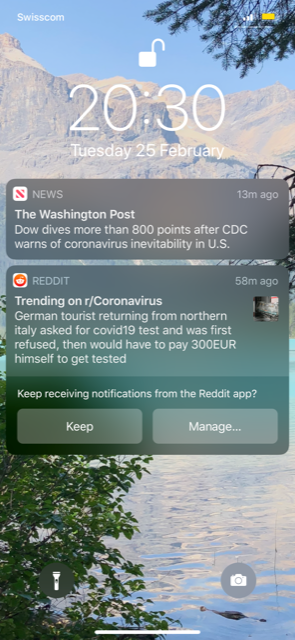
I decided, however, to examine two of the most active platforms for social media conversation – Facebook groups and Reddit communities. Both Facebook and Reddit witnessed a big uptick in activity in the first quarter of 2020 and both networks often pull in or reference content from a range of other social media, chat, and gaming sites too. They proved relatively easy to access and to monitor with full transparency on a day-to-day basis.
For Facebook I took the decision to focus on dedicated private groups where I judged the conversation was more likely to remain on-topic. Reddit is an open platform and so I identified a number of coronavirus-specific sub-communities that emerged in the early days of the pandemic and were proving popular amongst Redditors.
I began my work by identifying and joining a number of communities dedicated to coronavirus/COVID-19 on Facebook and Reddit (as outlined below). For Facebook this involved requesting access to a number of ‘private groups’ and answering some basic questions. Once I was established in these groups, I set up notification alerts for new content in each of the groups and communities and started to log contributions (when alerted) that could prove of interest to news journalists in a variety of ways.
Selection Criteria
There is a large – and ever-growing – number of groups dedicated to the coronavirus/COVID-19 on Facebook and Reddit.
I was keen to subscribe to those communities that were most active on a daily basis, where members were keen on sharing first-hand testimony and discussing the latest official guidance, and where moderators were committed to weeding out spam and misinformation to the best of their abilities. I avoided dozens of groups that were hyper-local, represented a specific trade or charity, or were directed towards mental health support alone.
Given the global nature of these groups, the administrators and moderators must oversee a broad membership. Although it’s impossible for them to put each prospective member through a thorough vetting – or indeed to keep close tabs on the activities of hundreds of members – the house rules they apply provide at least some oversight and many of the members themselves are quick to jump on offenders.
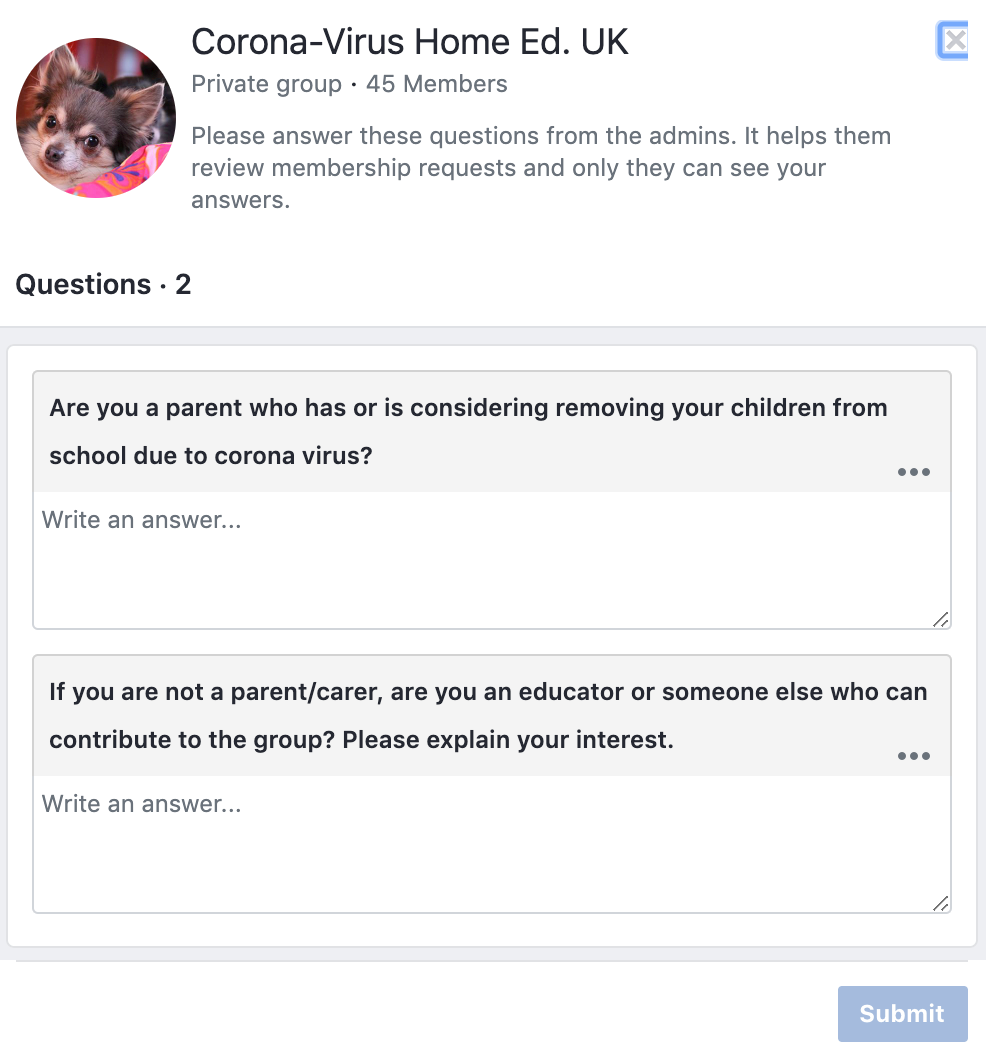
All the Facebook groups I joined were ‘private’ and required me to answer simple questions about my interest in the subject (see below) and, in some cases, my commitment to honest and undisruptive dialogue. I did not hide my interest, nor was I required to account for my background as a former journalist.
In this particular case, for example, I confirmed that I was a parent interested in the arguments for and against removing my children from school. And, in answer to the second question, I said that I was studying how people were using social media groups in connection to COVID-19 and was particularly interested in this group.
Once I gained entry to private Facebook groups I remained, for the most part, a silent observer – ‘liking’ a few contributions to remain active and only making contact with group members to corroborate accounts and specific information for the purposes of this report.
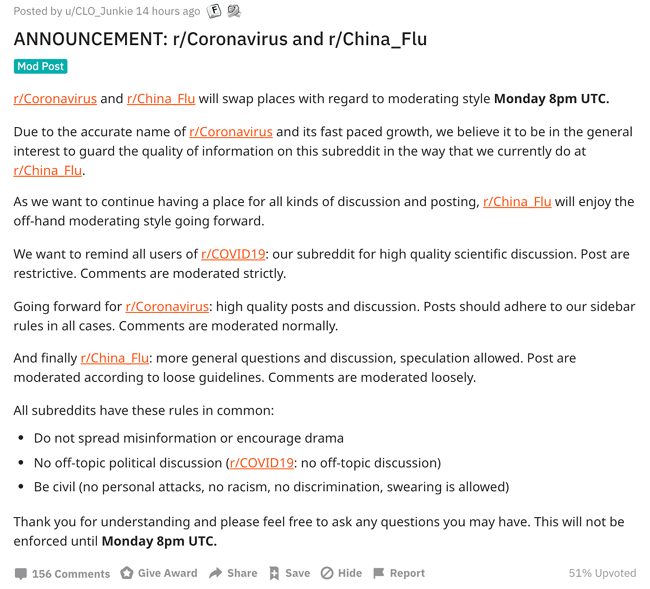
Table 1. Summary of groups and communities joined
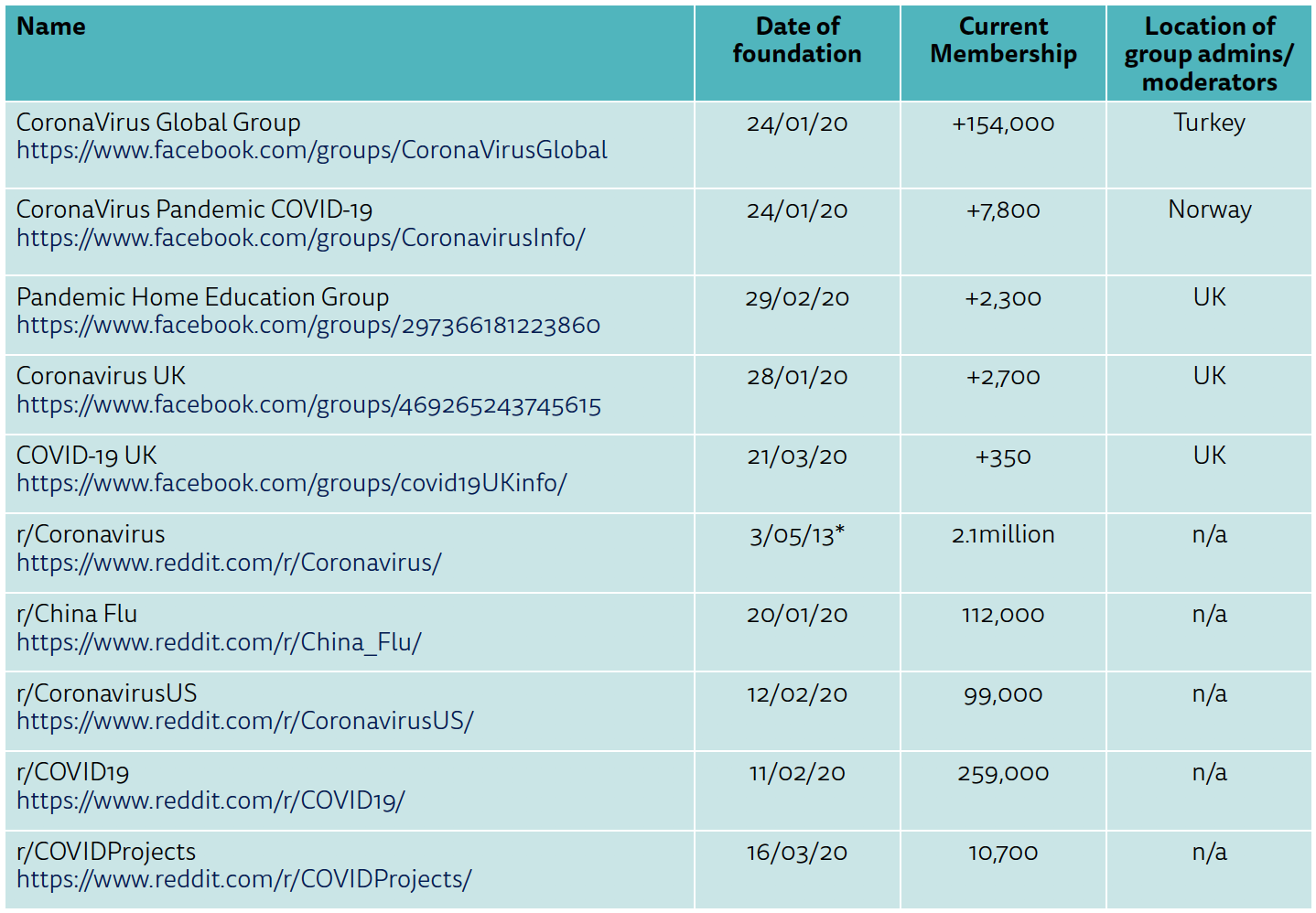
4. Findings in more detail ↑
In this section I will describe some of what I saw on Facebook and Reddit during the study. I will use examples and case-studies to highlight the relevance of the key findings and recommendations. What follows is not an exhaustive account of everything I saw over the three months, but it does give a sense of what journalists might expect if they enter communities like these.
Categories of Viable Contributions
As I outlined in the key findings section, for the purposes of this report I categorised contributions that I encountered in Facebook groups and subreddit communities as ‘news-worthy’ if they fitted into three broad categories:
- First-hand testimony in text, images, or video from people who had directly witnessed or encountered something of relevance to the pandemic (e.g. health professionals, those who had direct experience of the virus and the care afforded to them, those who had witnessed responses from officials on tackling the virus). In both private Facebook groups and Reddit sub-communities I found that more eyewitness testimony was from people outside of these groups and communities and then shared within them.
- Research on different aspects of the virus from those with defined expertise or access to experts (e.g. medical, scientific, technical).
- Peer-group discussion from those with issues of direct relevance to the pandemic (e.g. home schooling of children, food delivery, understanding of risk and of official guidance).
As in the case of all source material, potentially ‘news-worthy’ contributions I identified would require further analysis or corroboration before being used by journalists more widely. What I have detailed in this report are potentially helpful tip-offs to journalists.
For the testimony, corroboration would involve image and video verification (see First Draft for tips and tricks) and, ideally, a direct conversation with the contributor. For my investigation, it would mean conversations with the contributor and other known experts in the relevant field. For peer-group discussion, there had to be an exchange with the contributor to verify their circumstances and to ensure they were comfortable with their views being amplified to the public at large.
It’s also worth saying that some of those most active in the groups and communities I joined were not willing to engage directly with journalists – and even resorted to creating new groups on WhatsApp to avoid talking to the press. In other cases, journalists encountered hostility for reaching out directly to those in these groups. Some members resented the idea of being approached for interviews as they were unwilling to have any contact and/or were mistrustful of the journalists’ intent.
My work covered a three-month period from the last week of January to the end of April. Most of the contributions I detail emerged in the first six weeks of this project when countries were coming to terms with the virus alongside other news and had yet to enforce a full ‘lockdown’. From mid-March to the end of April I noticed many more links to testimony and research carried by traditional media. Essentially, blanket coverage of the pandemic across the media meant that there were fewer ‘untouched angles’ of potential media interest on these platforms.
First-Hand Testimony
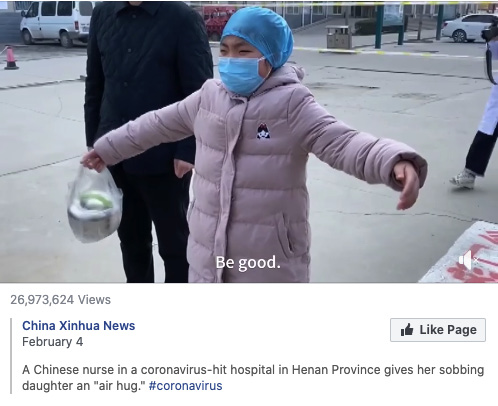
In the early stages of the pandemic the focus was on China. The first-hand testimony that was being shared in groups at this time highlights the importance of selectivity and verification. The majority of images and video clips on coronavirus in China that are still accessible on social media channels were carried by the state-run China Xinhua News. This includes widely circulated ‘viral’ video from those at the epicentre of the outbreak – such as on the separation between mother - a nurse at a hospital - and her daughter.
The fact it features prominently on state media with emotive music and a photographer in the background adds to a sense of it being ‘staged’. Although I cannot independently verify this footage the video DID appear across a number of local, national, and international news media in early February following its circulation on social media sites.
I also encountered footage allegedly showing residents in Wuhan being forcibly admitted to a hospital, carried by the Colombian broadcaster, CNC Bugavision. Following further investigation of the video (using a toolkit provided by the InVID European project) I found the same footage on this Twitter account on 6 February, uploaded to this site on 8 February and reported here on 10 February. It’s impossible to independently verify this video – and establishing a clear geolocation for the footage is hard – but there’s clearly plenty for news media to investigate further.
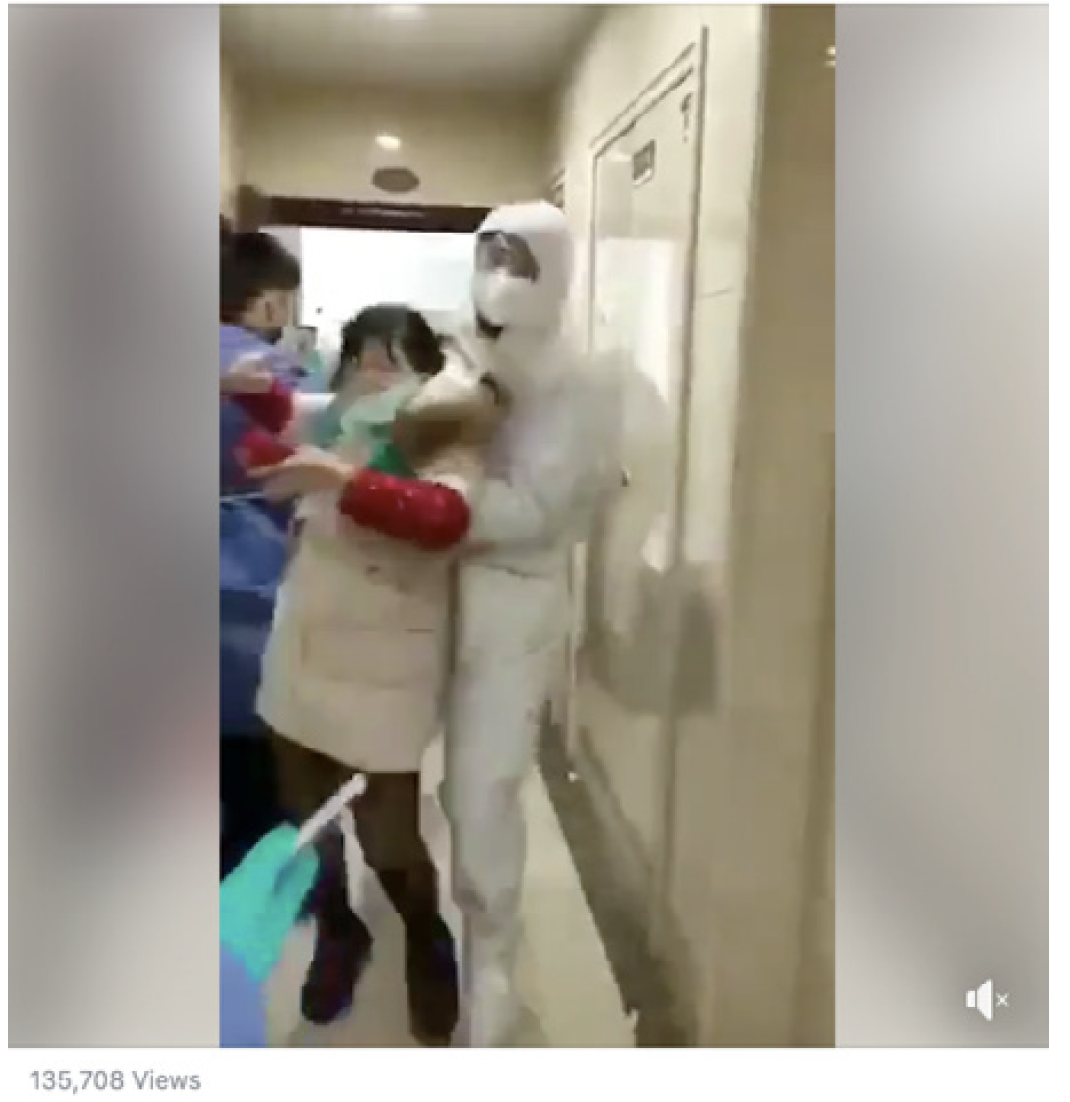
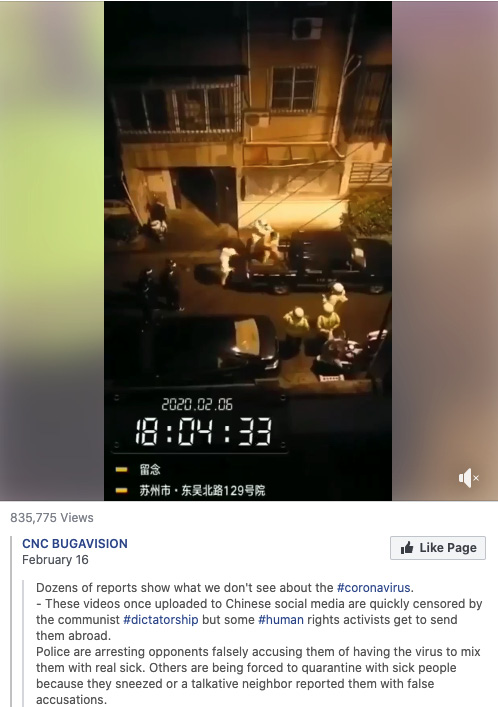
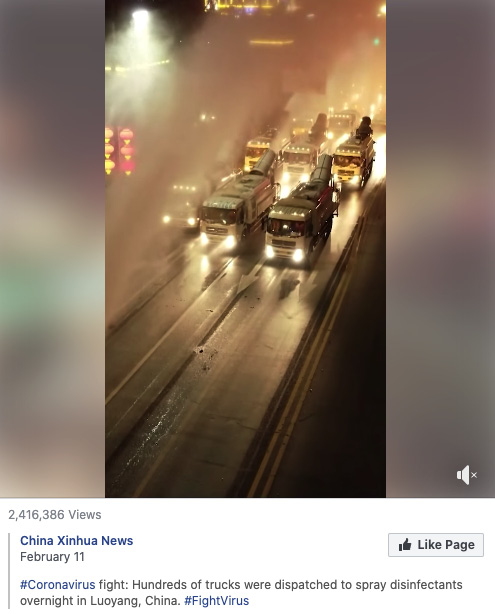
Other footage being shared by Xinhua News Agency in these Facebook groups in February and March (all of which cross-checked against other sources) included video of robots employed to offer services to those in quarantine, images showing temporary housing for those with ‘mild symptoms’, and video showing the streets in Luoyang being ‘disinfected’.
In all these cases, independent verification is important but not 100% conclusive.
Although many first-hand accounts from health professionals inside China have been removed from social media there are still plenty of accounts from repatriated foreign nationals. One example I encountered in the Coronavirus Pandemic COVID-19 Facebook group was a story (also uploaded to YouTube) from Michael Martin who lived in Wuhan for nine years. Michael was very candid about his experience and also open to answering questions via YouTube:
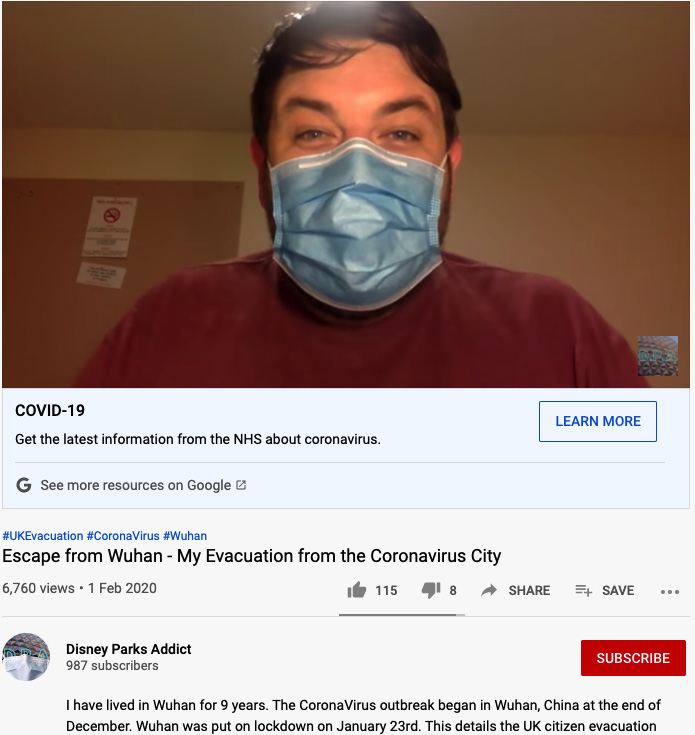
Another recurring theme of contribution and conversation in groups in the first month of my work concerned how local authorities were tackling the virus around the world. Again, although impossible to completely verify the authenticity of these posts, I was able to run a number of image checks on posts alongside direct outreach to the uploaders.
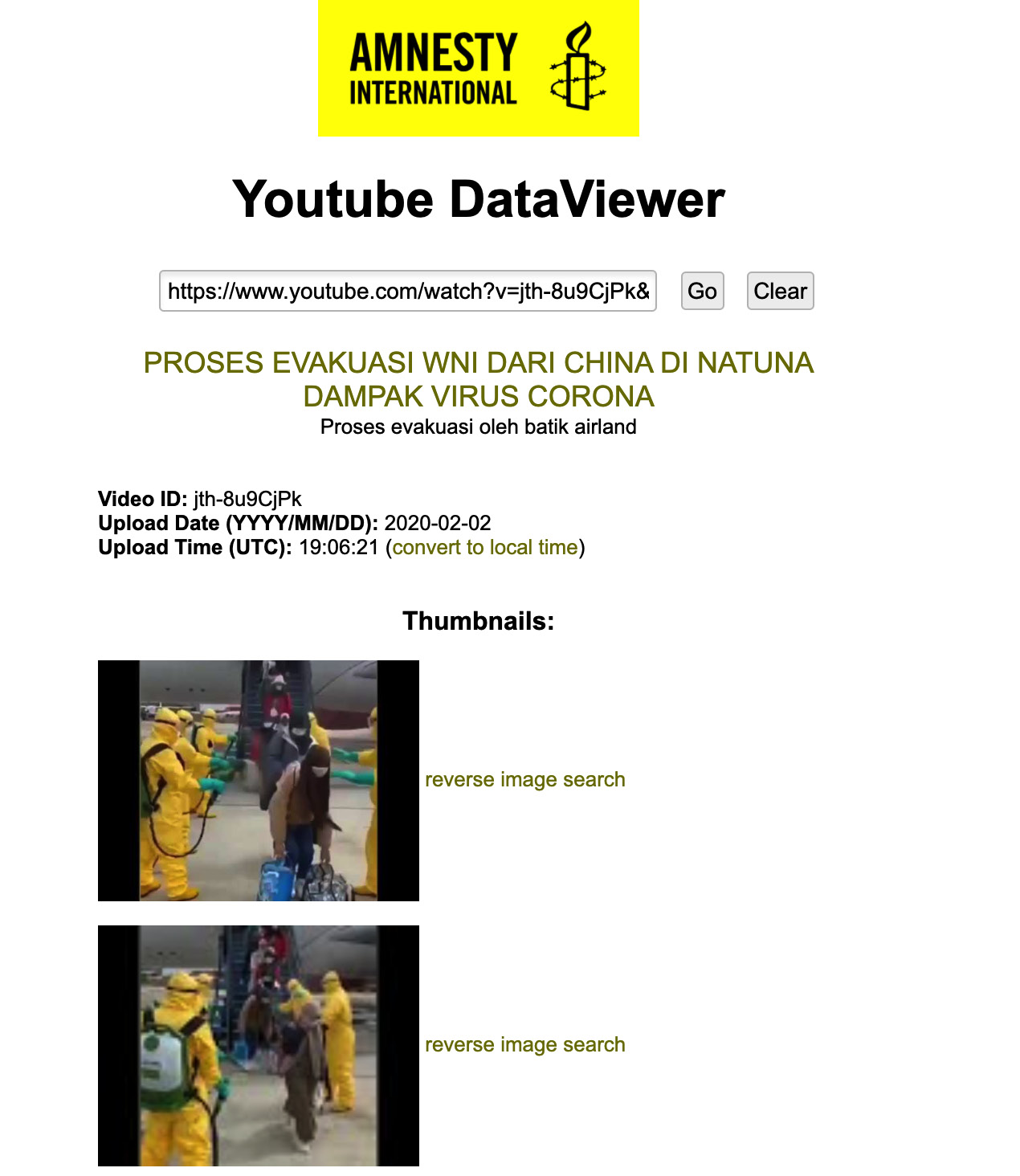
- I found video of people being ‘disinfected’ as they de-planed in Indonesia. This footage, carried by a number of news media, proved quite straightforward to cross-check against other available images online – as evidenced via Yandex and Amnesty International’s YouTube data viewer.
- Reverse image searches on another video showing worshippers going through a screening ahead of entering a mosque for Friday prayers in Indonesia was published widely across social media particularly – on Twitter and YouTube. Again, the Amnesty International YouTube data viewer was helpful for verification purposes to cross-check footage against news articles. Many of the social media posts were in Arabic (shared by Palestinian users), including footage of the same mosque taken from another angle, and I was also able to find the same image following a Google image search on the same video.
- I also discovered video of a street-level disinfection. This footage proved a little harder to track down, as it was actually filmed in Macedonia, not Turkey – the word for ‘disinfection’ being the same in Turkish as in Macedonian. However, a reverse image search on the image led me to an article in a Macedonian publication which helped to corroborate the story.
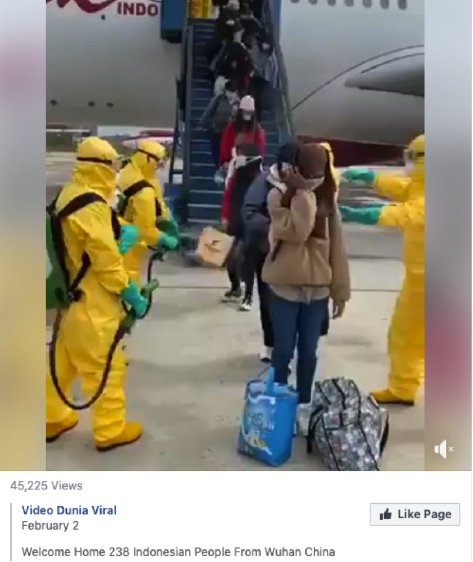
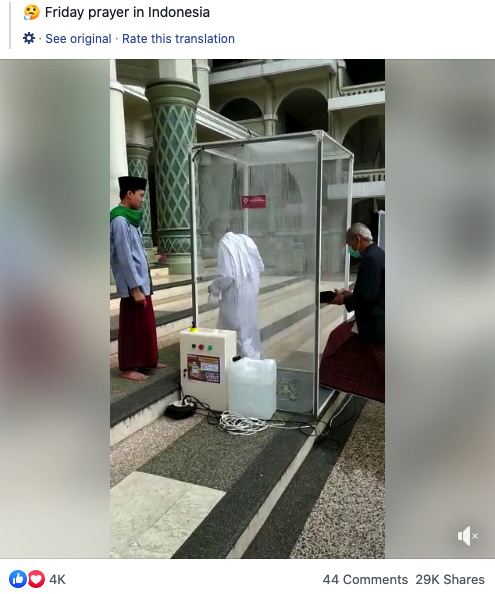
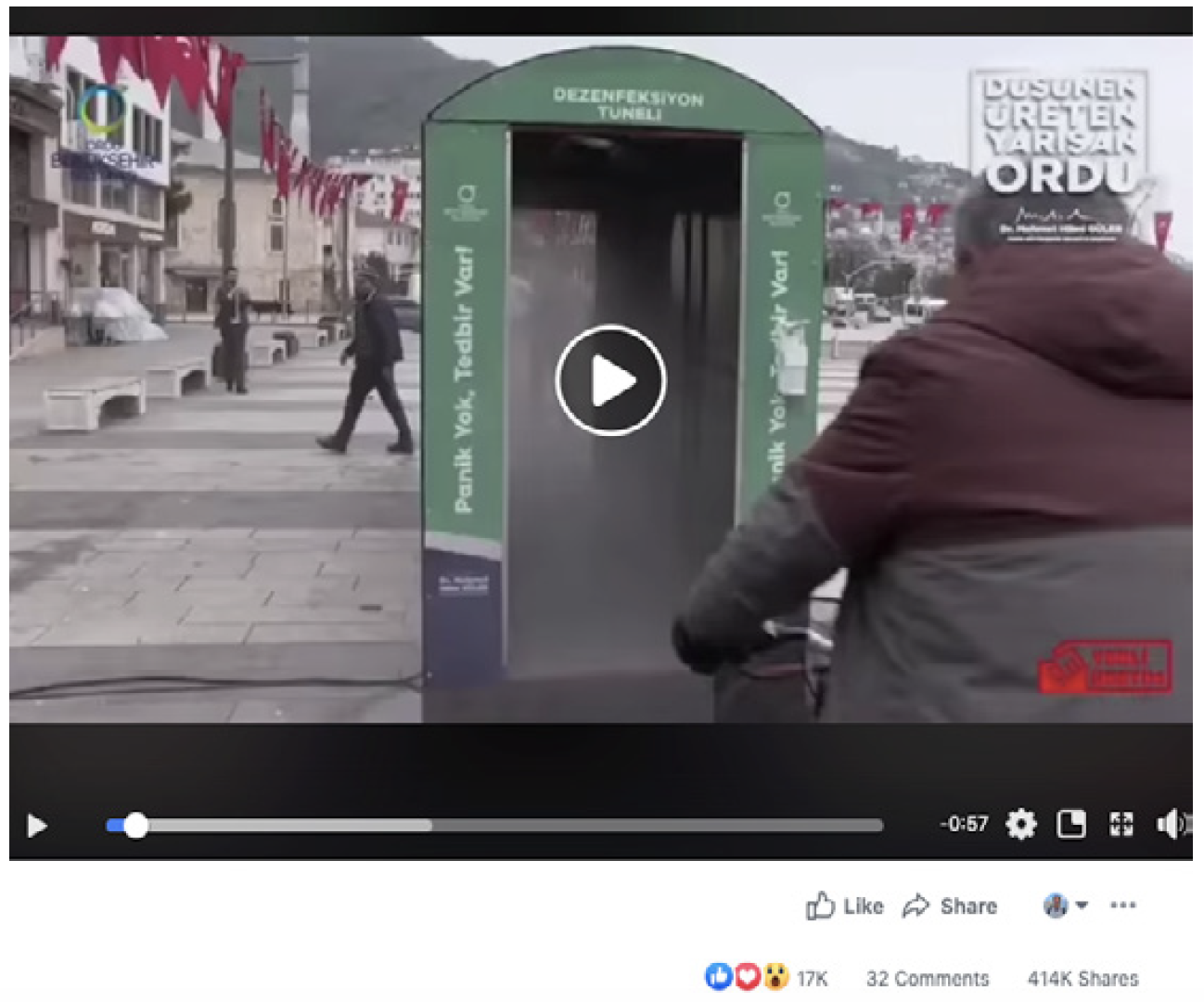

In the first month of my work a number of individuals shared smartphone images and videos of empty shelves in shops and supermarkets to illustrate the impact of the virus on food distribution. One example, published originally by a Romanian man living in northern Italy on 23 February showed empty shelves in a supermarket in northern Italy. Although these images were easy to cross-reference against local reports from the area at the time, only a direct conversation with the individual who took the footage will ensure full verification.
On Reddit, a megathread detailing unverified video from Twitter, Youtube and Weibo also proved quite a useful starting point in the early days of the pandemic. However, again, a number of the more interesting videos from China were ‘removed’ soon after they were uploaded. And, as always, any unverified content would need to be thoroughly fact-checked before it was used more widely.
One useful technique for finding first-hand reports and testimony in Reddit subcommunities is to filter for ‘local reports’ within a community. This approach helped me to source diary contributions like this one from Wuhan.
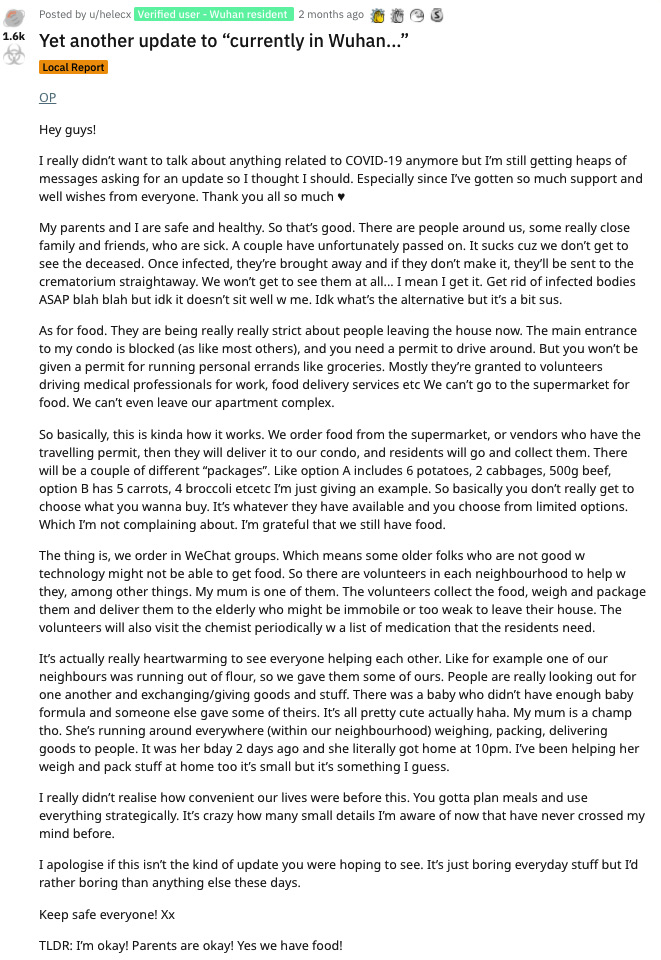
Interestingly (as the contributor points out) his post was originally removed by moderators from the coronavirus subreddit community for being ‘unverified’. But he’s a verified user in Wuhan, has been open to answering questions from other Redditors, and had plenty of interest to share in this early phase of the pandemic.
Some Redditors were also providing regular updates throughout February on the lockdown status in different cities. For journalists not able to move around freely this was a potentially useful thread of information. Not all those commenting in the thread were based in China but the open discussion between them meant specific questions could easily be raised on a range of subjects.
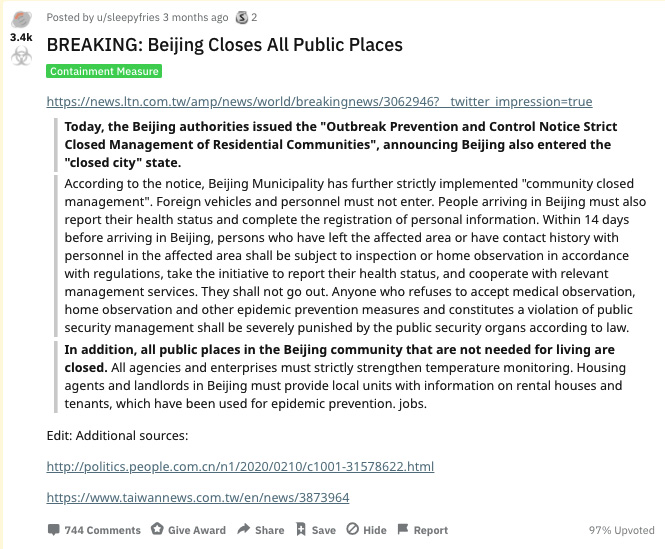
Alongside a focus on ‘local reports’, filtering for discussion threads and AMAs in subreddit communities provides another route for journalists seeking a helpful perspective on popular talking points and the questions uppermost in people’s minds on the pandemic.
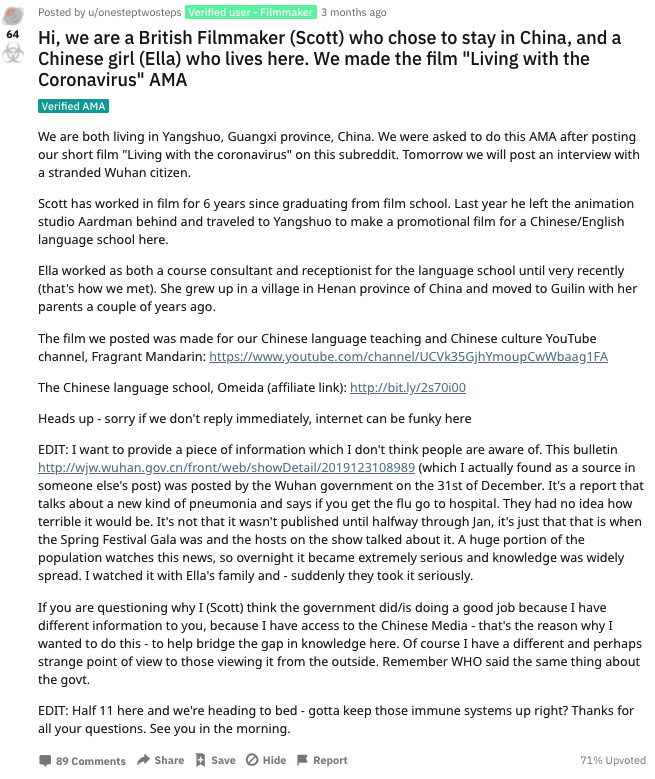
Throughout my work I was regularly alerted to some oft-extraordinary stories from Reddit subcommunities. One community called ‘Covid&Me’ features a range of (largely unverified) personal stories and contributions but I found a number of other, often more reliable, contributions elsewhere. These included:
- A story about a doctor in China who curtailed his own wedding to return to tackling the virus. The wedding took place in Heze, Shandong, on Thursday, 30 January 2020 and was only attended by five people, including the bride and groom. Image verification on the wedding photograph led me directly to the (uncropped) 30 January wedding image (see below).
- A girl left ‘home alone’ in China as her parents were taken into quarantine, shared by the well-known Chinese human rights activist and YouTuber Jennifer Zeng. It’s impossible to independently verify this story but I found the same image of this young girl and numerous references to her story on other news sites.
- A video blog from an infected nurse’s husband in Wuhan, which I was able to verify through the Amnesty International YouTube data viewer.
- How 3D printing was deployed to redesign and produce ICU valves in an Italian hospital (linking to a tweet and an article for full disclosure).
- And even some ‘light relief’, as evidenced in this (still unconfirmed) YouTube video of a neighbourhood in one Chinese town treated to the sound of the man in charge of the local public announcement system snoring, thanks to his microphone being switched on.

Original image
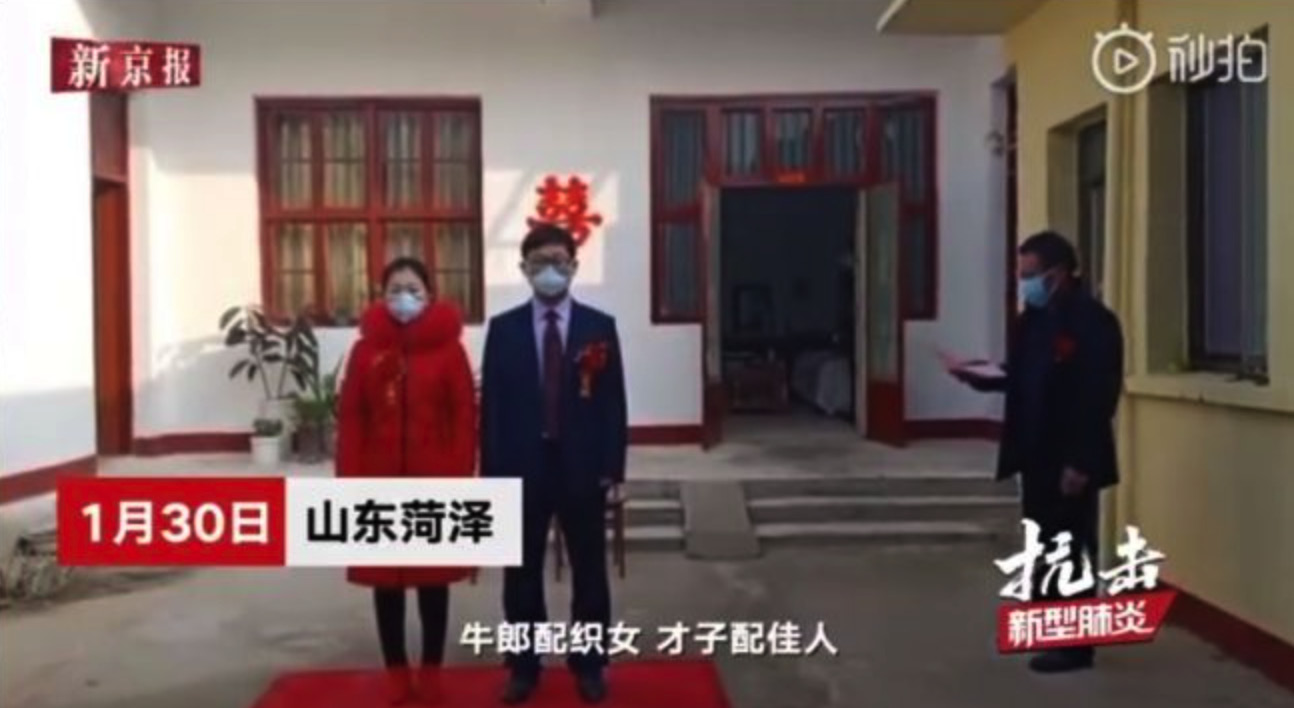
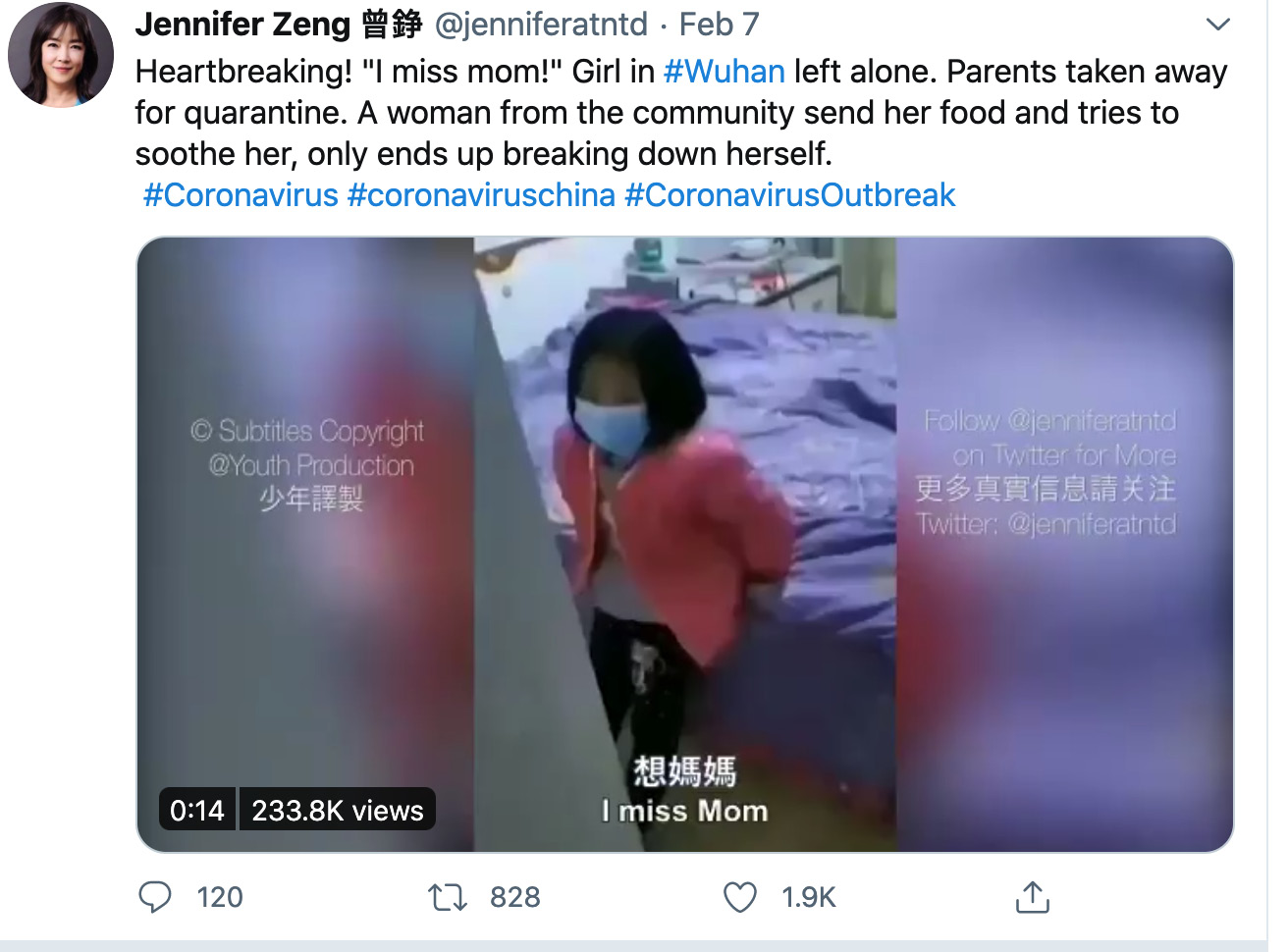
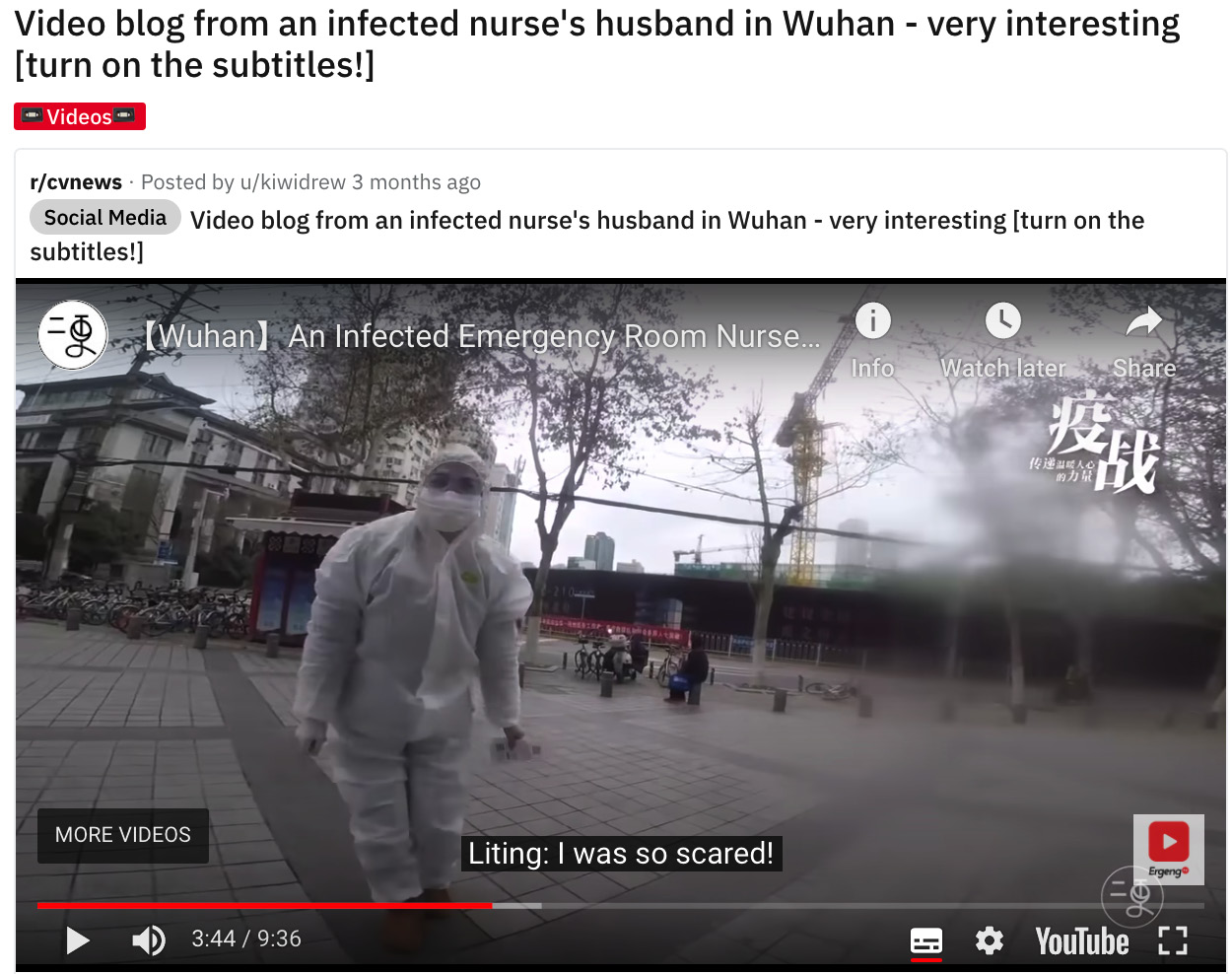
In other cases, some Redditors close to where outbreaks of the virus first occurred published regular diaries on their experience, with others weighing in on their own experiences and interactions in the comment thread. One contribution, from an ER doctor in New York City (and carried by the New York Times), generated a good deal of discussion on Reddit whilst posts from nurses sharing their thoughts were equally resonant. An illustration of this was one (subsequently corroborated) story of a Chicago nurse who quit her job as the hospital management where she was on duty stopped her from wearing her own N95 mask at work.
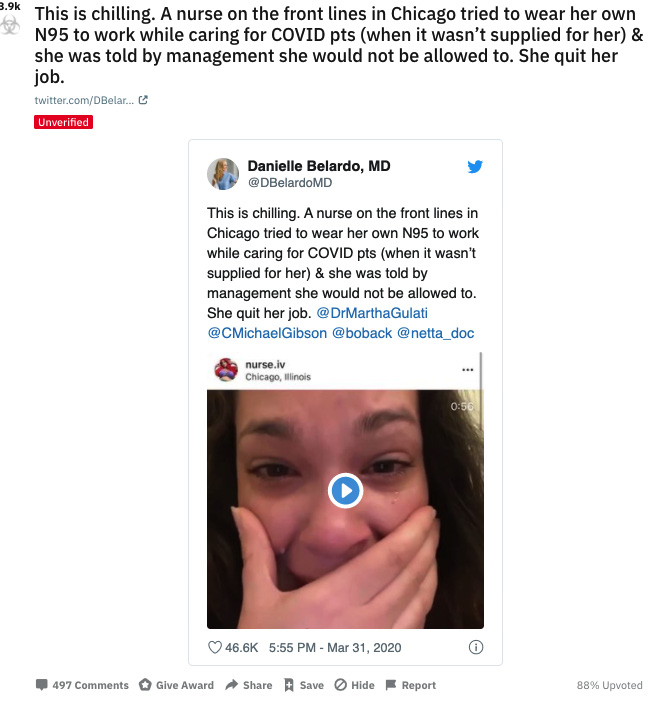

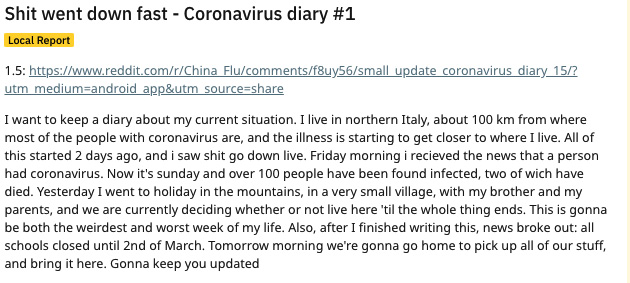
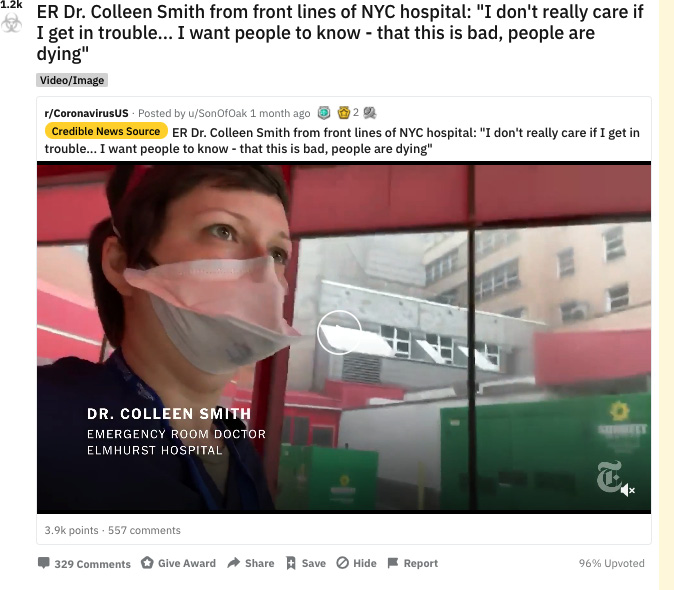
Another theme in first-hand testimony were Redditors looking to alert people to how the pandemic was affecting local community relations. One repeated theme was how local Chinese people and businesses outside of mainland China were being targeted, with people sharing what they’d witnessed.
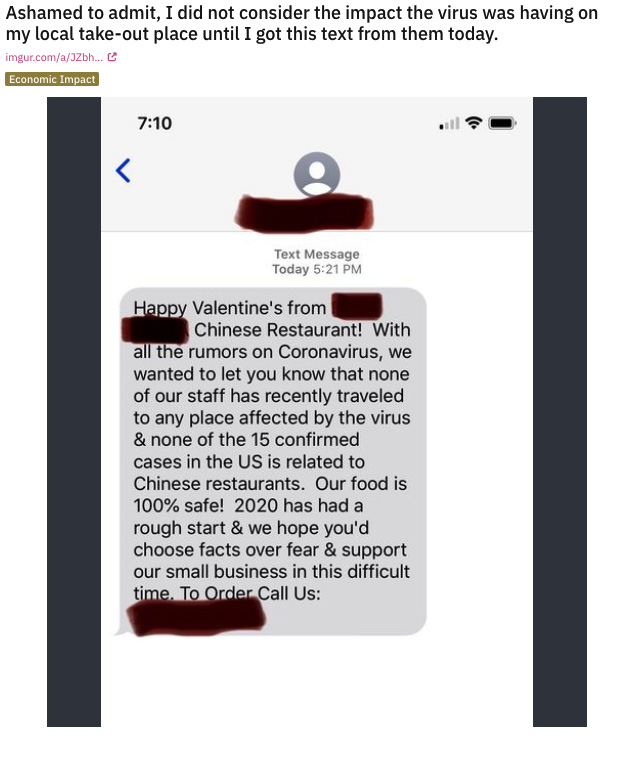
In other cases, Redditors used community threads to relay their own experiences, as hospital workers, restaurant owners, and – in this ‘unverified account’, working in a call centre:
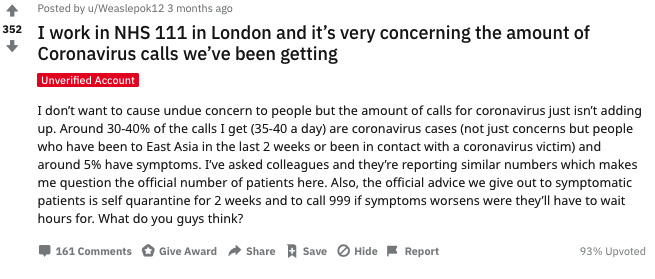
In these specific cases, the only meaningful verification possible for journalists is to reach out directly, as I did, to satisfy yourself (as far as is possible) that the posts are authentic.
Research
A number of scientific, medical, and public health experts have taken to live-streaming and publishing on social media to inform, educate, and engage a wider public on different aspects of the pandemic. For example, the Italian virologist, Roberto Burioni, has published a series of videos and other contributions to his 700,000+ Facebook followers. And, as this excellent piece in the MIT Technology Review highlights, many scientists and medical professionals have used Tik Tok, Instagram, and YouTube to help counter misinformation on the virus – with varying degrees of success.
Not everyone is a bona fide ‘expert’ and it’s essential for journalists to verify the credentials of those using social media platforms to theorise and share their ‘knowledge’. But live-streaming can be a rich source of content for journalists – particularly for media looking to understand what the public are most interested in knowing and most confused about too. It’s fairly straightforward for journalists to tap into the expertise of medical and scientific professionals in government and industry websites, publications and daily briefings. However, with the right circumstances, a Facebook Live or group ‘watch party’ or a Reddit AMA offers additional insight into the questions uppermost in the minds of the public.
The Forum at Harvard T.H. Chan School of Public Health is just one example of a particularly useful Q&A hosted via Facebook Live – and advertised widely in groups, in early February.
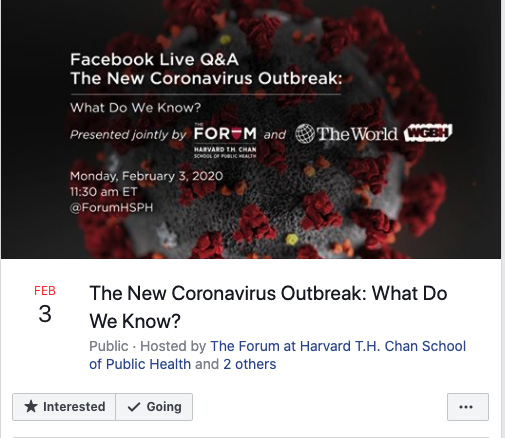
Whilst Reddit AMAs help to disseminate information, subcommunities regularly feature academic papers, journals, and reports, for example, on the the impact of school closures, (published on the Jama network) and on a WHO report from a team of experts who visited China to investigate the virus and detailed ‘some interesting facts … not yet read in the media’.
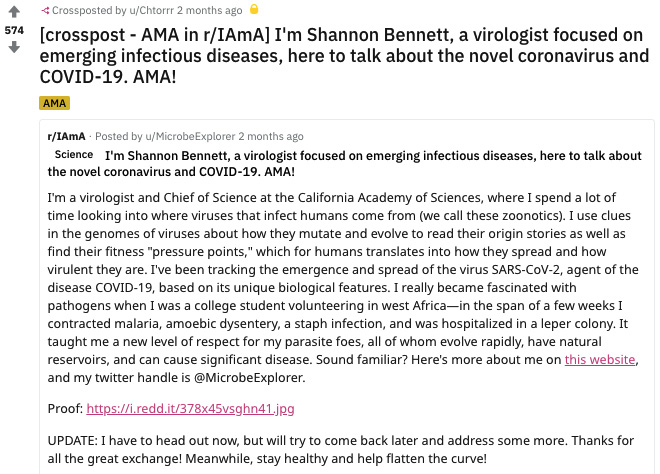
Another focus I encountered in Reddit subcommunities was discussion around new and ongoing scientific and medical field studies. For example, an initiative for lung CT scans outside a Brussels hospital.
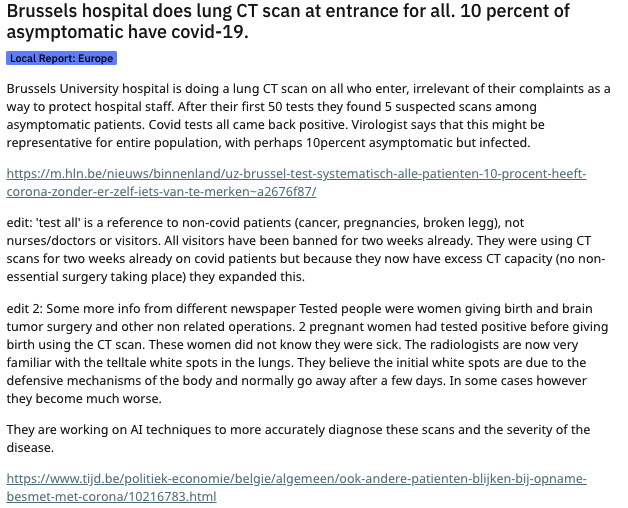
I also found administrators and moderators reaching out to community members to participate in field research. One moderator, for example, in the r/coronavirus Reddit subcommunity launched an initiative to encourage people to take part in scientific studies.
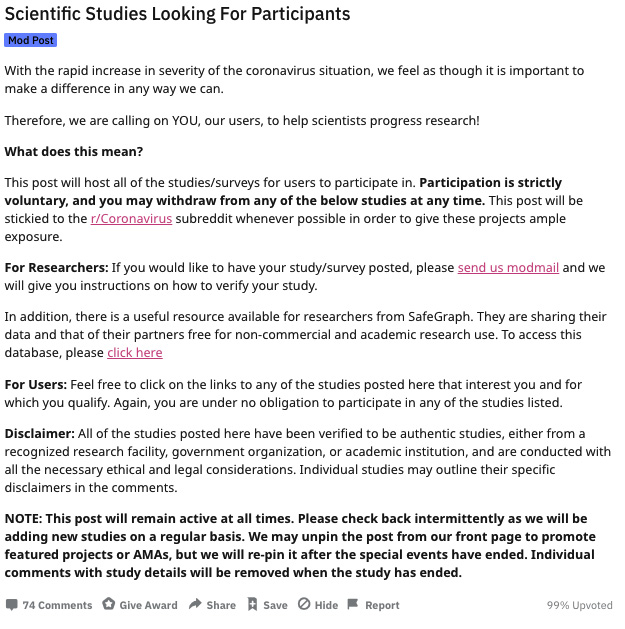
Research papers, studies, and experts are all far easier for journalists to cross-check through other reputable sources. Although social media do attract pranksters, fantasists, and conspiracy theorists, there’s plenty of expertise for the discerning journalist to discover here too.
Peer-Group Discussion
Some group members I encountered in the course of my work had legitimate questions about official advice on dealing with COVID-19. This was particularly evident in the Pandemic Home Education Group. Parents in this group talked openly about withdrawing their children from school, about the advice they were and weren’t receiving, and – in some cases – about children with underlying medical or behavioural conditions.
This is clearly a far more sensitive environment for journalists to inhabit. Being a parent with children of school age is a prerequisite for joining this particular group and, as I point out in my recommendations, transparency and building rapport with other group members is essential. There’s little to be gained in approaching an anguished and frustrated group member for public comment before building any kind of relationship with them in the group.
Another frequent topic of discussion in groups and communities has been when and how best to seek medical advice? This isn’t so much about access to health care but about understanding symptoms and knowing when it is best to seek medical help. Some countries offer a free helpline (e.g. NHS Direct in the UK) and home testing kits are becoming increasingly available too. However, in the early days of this pandemic, people were particularly worried about approaching their GPs. This was particularly evident amongst those based in the US where the cost of seeing a doctor could be prohibitive to those without medical insurance.
Finally, Redditors have also used communities to talk about employment and working conditions during the pandemic. In the first month of my work a number of people, not yet working from home, worried that their employers were not putting in place requisite conditions to allow them to continue working safely. Others, however, working in factories and distribution centres – like Amazon – were keen for people to understand that their work needed to continue.
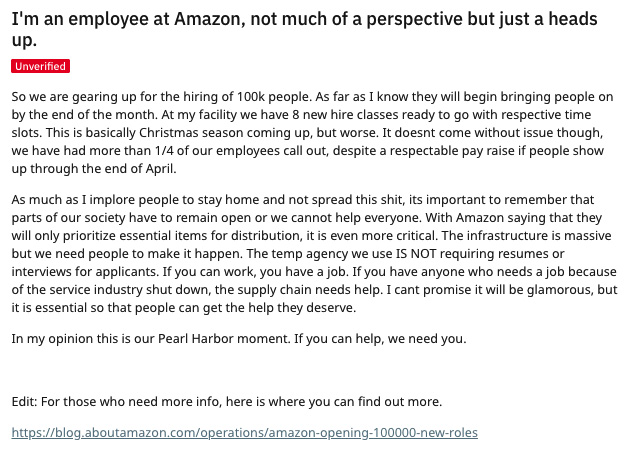
5. Conclusion ↑
For any enterprising journalist intent on expanding their digital beat there are a number of opportunities in invitation-only Facebook groups and subreddit communities. The challenge, as I have set out in this report, is to be able to distinguish fact from fiction, to forge reliable connections with group administrators and moderators and those active in the communities, and to ensure you act responsibly and decisively when viable information first emerges.
Misinformation, conspiracy theories, and general falsehoods may be ubiquitous across these platforms but, given their increasing popularity, and that fact that much of what happens there concerns ordinary people sharing things, sometimes important things, in good faith, media professionals would be wrong to dismiss social media communities as uniformly unreliable. As local and print news continues to decline in popularity, over half of those who were surveyed for the 2020 annual Reuters Institute Digital News Report indicated that they ‘used some kind of open or closed online group to connect, share information, or take part in a local support network’. It’s simply too large a beat for journalists to ignore.
With the verification tools, techniques, and recommendations I have provided in this report it’s clearly possible for journalists to seek out original stories, fresh angles, and new evidence in these online communities. Where information is being shared in an invitation-only environment, developing a trusting relationship will be important. In other cases, where information is being shared more publicly, cross-checking it against other sources including discussion amongst the community itself is essential.
Timing is critical when handling content on these platforms too. As a story unfolds there’s a tendency to see the same testimony and evidence shared by multiple users (irrespective of their locus on the story). Journalists need to verify that what they’re observing is authentic and original and build rapport with users, moderators, and administrators in a group or community. They also need to act swiftly to reach out to first-hand observers and to download potentially news-worthy content before it’s taken down. I amassed dozens of links to first-hand accounts in China in February and March 2020 that are no longer available online today. In some instances, these contributions may have been removed by users as they were no longer confident in the authenticity of what they were sharing. In other cases, the content may have been removed following state intervention.
Securing access to and forging connections in a broad coronavirus group is one matter, doing so in a more niche community, where, for example, being a parent or having a particular perspective is essential, presents an altogether different challenge. There’s no substitute for direct experience in these interest-specific groups and, for those without, it may be easier to work in tandem with a colleague in these circumstances. It would have been much harder to both gain entry and the confidence of the Home Education Facebook group if I didn’t have children of my own.
For the majority of my work I operated as a silent observer, seeking out interesting angles, testimony, and discussion threads and taking care not to disrupt or to speak out unnecessarily. I was keen to listen and to learn rather than to create news stories. However, on the occasions I did need to verify information, a direct message usually solicited a quick response. I never hid my interest from anyone and was never shunned for pursuing it.
Transparency is essential but so is a determination to build and forge meaningful connections. Although there are those intent on scamming and spreading rumour and falsehoods in these social media communities, there are plenty of others seeking genuine connection and honest conversation. These groups and communities are a hugely valuable resource to journalists seeking to develop a digital beat across a variety of topics and themes.
Every news organisation requires a robust newsgathering operation. There’s little substitute for the eyes and ears of your own reporters, producers, and researchers. As the pandemic grew it was important for journalists to report on businesses and from inside intensive care units and care homes.
However, for a global story of this nature – with social distancing and lockdown measures at its heart – digital communities and groups provide vital perspective of a different kind. Participants are publishing what they (and those close to them) are observing and thinking in a way that journalists can never replicate and are a constant weathervane on an unfolding story that affects us all.
Online communities offer a rich tapestry of ongoing focus groups and eyewitness testimony. Alongside the views of key opinion leaders – politicians, the business community, academics, and experts – these groups offer a unique perspective in the midst of one of the defining stories of our age.
Select bibliography ↑
- Bedingfield, W. 2020. How Facebook Turned into a Coronavirus Conspiracy Hellhole’, Mar. wired.co.uk
- D’Urso, J. 2020. ‘How the Coronavirus Pandemic is Changing Social Media’, July.
- First Draft. 2020. ‘Coronavirus Resources for Reporters’, Apr. firstdraftnews.org
- Frankel, M. 2018. ‘The Promises and Pitfalls of Reporting within Chat Apps and Other Semi-Open Platforms: A Journalist’s Guide’, 10 July, NiemanLab.org
- Gault, M. 2020. ‘Reddit Can’t Quarantine Coronavirus Misinformation’, Vice, Feb.
- Newman, N., Fletcher, R., Schulz, A., Andı, A., Nielsen, R. K. 2020. Reuters Institute Digital News Report 2020. Oxford: Reuters Institute for the Study of Journalism.
- Ohlesier, A. 2020. ‘Doctors are Now Social-Media Influencers: They aren’t All Ready for it’, MIT Technology Review, April.
- Robinson, O., Spring, M. 2020. ‘Coronavirus: How Bad Information Goes Viral’, Mar. bbc.co.uk/news
- Rosen, G. 2020. ‘An Update on Our Work to Keep People Informed and Limit Misinformation About COVID-19’, Apr. fb.com/news
- Scott, M. 2020. ‘Facebook’s Private Groups are Abuzz with Coronavirus Fake News’, Politico, Mar.
- Zuckerberg, M. 2019. ‘A privacy-focused vision for social networking’, Mar.
Note:
1 Facebook issued their Q2 results after we went to press: https://investor.fb.com/investor-events/event-details/2020/Facebook-Q2-2020-Earnings-/default.aspx
About the Author↑
Mark Frankel is an experienced digital media and communications professional with more than two decades of experience in journalism and content creation and an MSc from the London School of Economics and Political Science in Political Theory. Between 1999 and 2018 he worked as a producer and editor for BBC News. As Social Media Editor he was responsible for a number of the Corporation’s largest and most successful social media channels and the management of a dedicated User Generated Content (UGC) team in the newsroom. This period coincided with a rapid expansion of the use of social media by news organisations and an accompanying focus on the rise of misinformation on these platforms. The UGC team helped develop new initiatives to champion fact-checking on digital platforms, assisting journalists in the newsroom to verify eyewitness testimony and the sourcing of reliable contributions across a host of breaking and developing news stories. In 2018 Mark Frankel was invited to participate in a Knight Nieman Visiting Research Fellowship at Harvard University where he conducted research into the opportunities and pitfalls for journalists seeking stories in social media groups and communities.
Published by the Reuters Institute for the Study of Journalism.
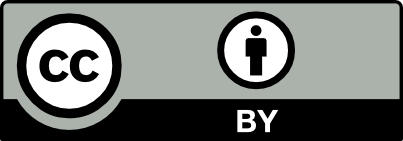
This report can be reproduced under the Creative Commons licence CC BY. For more information please go to this link.

